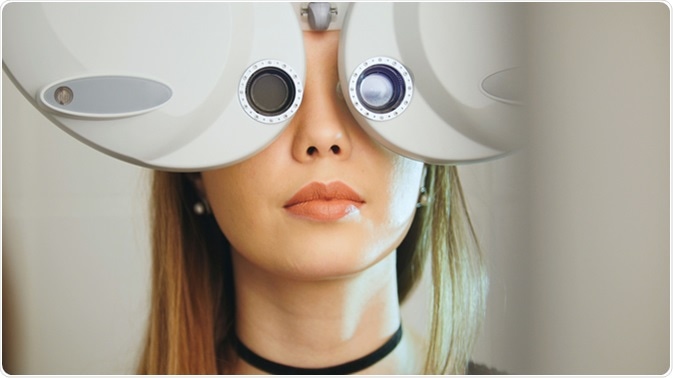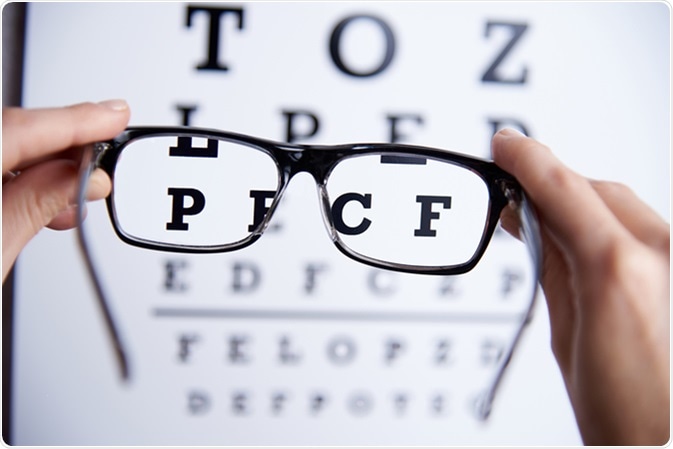The eyes are among the most sensitive organs of the body and are considered to be one of the most important senses. Despite this, taking good care of our eyes is often ignored, resulting in many people losing their sight and needing glasses.

Image Credit: Studio 72 / Shutterstock
Visual Acuity Test vs. Eye Examination
A general layman perception about eye testing is that it is only for checking the power of the glasses we need. However, there is much more to a full eye examination than visual acuity tests.
Visual acuity tests involve the assessment of reading capacity of eyes from a given distance. The patient is asked to read out the fonts of different sizes, while covering one eye at a time, and with both eyes open.
Based on how conveniently one can read the alphabets and characters, the optometrist keeps changing the lens combinations until appropriate power is identified.
This is the most basic and manual method of evaluating visual acuity, which is also often practiced by non-specialists and opticians locally. Ophthalmologists also supplement it with a machine test for approximation of eye power.

Image Credit: VIKTORIIA NOVOKHATSKA / Shutterstock
In contrast to a routine visual acuity test, a full eye examination covers deeper aspects of the visual function.
It is always performed by a qualified optometrist or ophthalmologist. They look for any underlying symptoms or conditions such as retinal detachment, glaucoma, development of cataracts, and macular degeneration.
Other serious health problems such as diabetes, hypertension etc. can have an impact on the visual function, and hence, are also taken into consideration during complete eye check-ups.
Ophthalmologists generally follow the practice of taking medical history and noting any such worrying medical conditions. However sometimes, it may also work in a reverse manner.
A close examination of internal structures of eyes can point towards these serious conditions. This may serve as an early indicator for proactive management of diabetes, potential stroke, or hypertension.
Importance of Eye Checks
Eye examinations check for the visual function for proximal vision as well as distance vision. The basic visual acuity screening identifies if and when one will need to start using glasses for the first time.
It also indicates the corrections needed periodically based on improvement or deterioration of visual function over the years.
In addition to near-sightedness and far-sightedness, optometrists also look for any other ocular symptoms.
Issues such as astigmatism, even though very common, are oftentimes very disturbing in daily life. Requirement of cylindrical power is also identified during such checks by the optometrists.
More than 75% cases of blindness are preventable if identified in time. While eye examinations have so much to offer, they are not of much use if not done regularly.
Many of the ocular symptoms and conditions, once developed fully, are irreversible or very difficult to cure at a later stage. Therefore, thorough examination of lens, retina, and optic nerve are pivotal parts of a regular full eye check-up.
Cataract is a condition causing the lens of the eye to become opaque, resulting in blurred vision. Timely identification of cataract, and the lens replacement surgery are essential to restore normal vision.
Retinal detachment, a medical emergency, can lead to complete blindness, if not treated appropriately in a timely manner. Early spotting of any such development during regular eye examinations can prove to be a boon.
What are the symptoms of a detached retina?
A full eye check-up also has the capability to identify the conditions including, but not limited to, strabismus (misaligned/crossed eyes), amblyopia (inconsistent processing of images by brain from both the eyes), and age-related macular degeneration.
Recommended Frequency of Eye Check-Ups
Whether a patient will only need visual acuity test or a comprehensive eye examination, and how often, is purely driven by the current ocular health of the patient.
However, as a rule of thumb, children need less frequent comprehensive eye tests compared to adults, who should be checked at least once in two years for their overall ocular function. Doctors recommend more frequent eye check-ups during old age.
The individuals whose job is heavily demanding in terms of visual engagement, are also advised to get their eyes fully checked more often than once in two years.
Further Reading
Last Updated: Feb 26, 2019